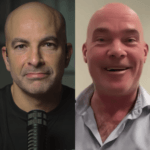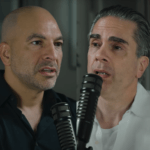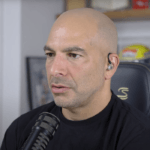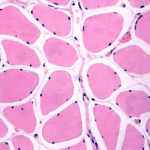In this “Ask Me Anything” (AMA) episode, Peter answers a wide range of questions from subscribers. Bob Kaplan, Peter’s head of research, asks the questions. If you’re not a subscriber and listening on a podcast player, you’ll only be able to hear a preview of the AMA. If you’re a subscriber, you can now listen to this full episode on your private RSS feed. You can also listen to this full episode on our website at the AMA #10 show notes page. If you are not a subscriber, you can learn more about the subscriber benefits here.
We discuss:
- Does testosterone supplementation impact longevity? [2:40];
- Under what conditions does Peter decide to treat patients who have low testosterone? [8:50];
- Are there risks involved with testosterone replacement therapy? [17:10];
- How does Peter diagnose and treat hypothyroidism? [21:30];
- How might someone do time-restricted feeding while also adding muscle mass? [26:30];
- If building muscle requires higher levels of IGF-1, should we be concerned about longevity? [34:45];
- How to preserve muscle mass while fasting [41:45];
- Is it possible to simultaneously lose fat and add muscle mass? [46:30]; and
- More.
Does testosterone supplementation impact longevity? [2:40]
Is Peter a “fan” of T supplementation?
- Depends on the person and the situation, says Peter
Does TRT increase lifespan?
- Peter is not convinced it will increase lifespan
Does low T lead to aggressive prostate cancer?
- Low testosterone is associated with more aggressive prostate cancer
- But that’s probably not saying that low testosterone causes aggressive prostate cancer
- What it says is that if you have prostate cancer in a low androgen environment, it is likely to be more aggressive
Does TRT improve healthspan?
-There are 3 components of healthspan
- Cognition
- Physical “exoskeleton”
- Emotional health
-TRT and cognition
- The literature does NOT support the idea that it improves cognition…
{end of show notes preview}






Peter, thanks for the great content. A few questions come to mind: Other numbers being ~normal, with a borderline (~ 4 to 5) TSH and no symptoms – you would typically decide not to seek a more ideal TSH level with Synthroid/T4 ? How big a variable can TSH be on cholesterol levels ? Should TSH be optimized before tuning cholesterol medication ? thanks a bunch.
Re testosterone and cancer, when I started to be concerned with mild BPH about twelve years ago, reading on Mayo Clinic’s website (and other medical websites) I found the results of studies that had shown that the alpha blocker Doxazosin combined with Finisteride reduced the occurance of prostate cancer by some very significant percentages. In my case, the alpha-blocker caused immediate relief from the BPH and continues to do so all these years later. The effects of Finisteride apparently take about six months to do its work and I did take it for several years, however I no longer take it since it eventually caused some odd effects regarding normal sexual sensations. It certainly did help with hair growth – which I wasn’t concerned about although no aging person is likely to complain about unexpected new hair growth :-).
The reason I’m commenting is, if I understand the process correctly, Finisteride reduces prostate enlargement by inhibiting the production of testosterone. Testosterone, I recall reading, acts as an irritant to the prostate . . . one reason the prostate swells up in reaction to it. (Of course, I’m not inferring testosterone is the ONLY reason for causing a swollen prostate. Testosterone is only one source of irritation, but a significant one.) In this podcast I’m hearing that “low testosterone” contributes to an environment conducive to the growth of cancer (if cancer is already present) whereas my common sense understanding of things would lead me to believe a low testosterone environment would be _less_ friendly to cancer development.
The multi-year long studies I refer to at the beginning showed that Finisteride (combined with Doxazosin) _lowers_ the incidence of prostate cancer. Finisteride inhibits production of testosterone, creating a low testosterone environment. I’m experiencing a logic disconnect here.
I’m 74 and have been going to the same Aviation Medical Examiner for almost 30 years. He’s a trauma surgeon and has personally attended many autopsies in his long career and told me twenty years ago or more that all of us over 60 or so have cancer cells encapsulated within our prostates. Occasionally something will provoke a virulant form of prostate cancer that requires aggressive treatment, however for the vast majority of men we will die of something unrelated to our encapsulated prostate cancer cells long before these cells cause any problem.
In my medically uneducated mind I would guess an enlarged and irritated prostate is a lot more likely to expel some of these cancerous cells than would an un-irritated prostate. Since testosterone is an irritant, keeping a low level of this hormone would seem to be logical. Given these thoughts, I’m very curious just how a “low testosterone environment” is somehow conducive to cancer development when multiple studies have shown that reducing testosterone levels through use of Finisteride significantly _decreases_ the occurance of prostate cancer.
Finasteride does not inhibit the production of testosterone, this would be catastrophic. Finasteride is a 5α-Reductase Inhibitor. A portion of testosterone in the body is normally converted to a more potent androgen, called Dihydrotestosterone, aka “DHT”, and this is done via an enzyme called 5α-Reductase. Finasteride inhibits this enzyme and therefor inhibits the conversion of Testosterone to DHT.
DHT is the hormone of concern in regards to hair loss, prostate cancer, and other androgen-related disorders.
So Finasteride reduces the conversion of testosterone to DHT, and in doing so, reduces the levels of DHT in the body. This information easily found online. Look these terms up on Wikipedia for a more detailed explanation.
Re: leucine from feathers
If the end product is still Pharmacy grade or food grade wouldn’t it be equivalent to the corresponding food or pharmacy grade products utilizing another source? If purchasing a food or pharmacy grade leucine supplement, is the problem false labeling of a pure end product?
I just became a member so I could listen to this entire AMA and read the show notes because I am desperately interested in the discussion on hypothyroidism and I have an appointment with my physician next week to go over lab results. However, when I finally got to that segment of the discussion, it was mostly a punt to some white board thingy. I was looking for concrete lab ranges, etc.
Any idea when the more detailed analysis will be available? I’m a huge fan, keep up the good work.
me too. My GF is going though some issues and having Attia chime in would be really helpful.
I also was looking for more info on thyroid problems and hashimotos disease
I’d be interested in your opinion on whether we can BUILD (not just maintain) muscle efficiently in a fast AND/OR a caloric deficit diet for fat loss by leveraging Essential Amino Acids supplements that provide you the optimized ratios for Anabolic Utility (L-Leucine, L-Valine, L-Isoleucine, L-Lysine HCL, L-Phenylalanine, L-Threonine, L-Methionine, and L-Tryptophan).
I am in the middle of a caloric deficit diet of around ~500 calories per day while consuming an EAA supplement with those optimized ratios that is similar to 50g of protein from Whey, but with less than 4 calories and 99% Net Nitrogen Utilization (whereas Whey is only 18% with much higher calories, especially the lower grade Whey protein shakes with extra carbs/sugars). The goal of taking this supplement is to hit the 1:1 ratio of grams of Protein to bodyweight without having to consume too many calories from food — and sometimes, without having to consume any considerable amount of calories (except 4 calories per serving of EAAs, around 4 servings per day) when I am fasting for a day or 3 and therefore because it’s less than 50 calories, not breaking the fasts.
I am seemingly putting on more muscle while losing fat slowly (around 1.5 to 2lbs per week) and I’ve gone from 25% body fat to around 17% currently, with the goal of 12% and then switching to a caloric maintenance diet while continuing to build muscle gradually over time with a system called X3Bar for variable resistance.
Thoughts? I haven’t seen any evidence you need to be in a caloric surplus to build muscle if you have the right amount and profile of amino acids to build muscle and your body can leverage your existing fat (therefore fat loss) for energy until you reach your goals.
What supplement is it that you’re using?
Hey – New here. In which podcast did he cover the female side?